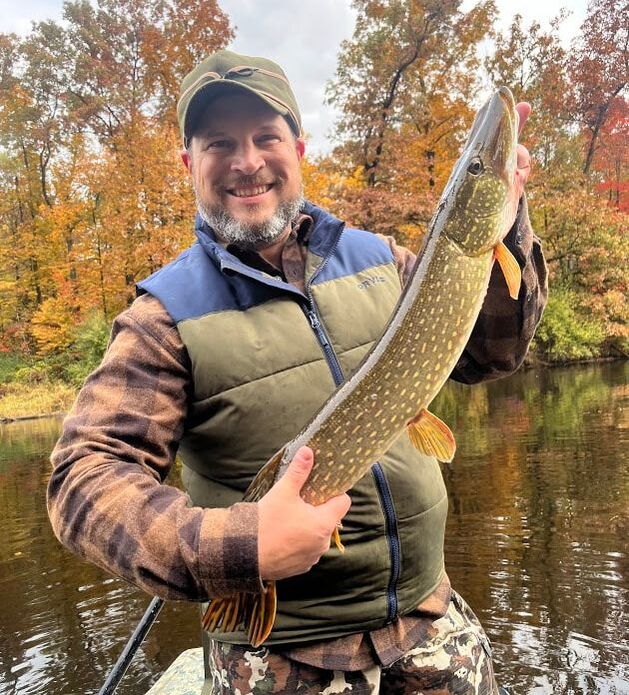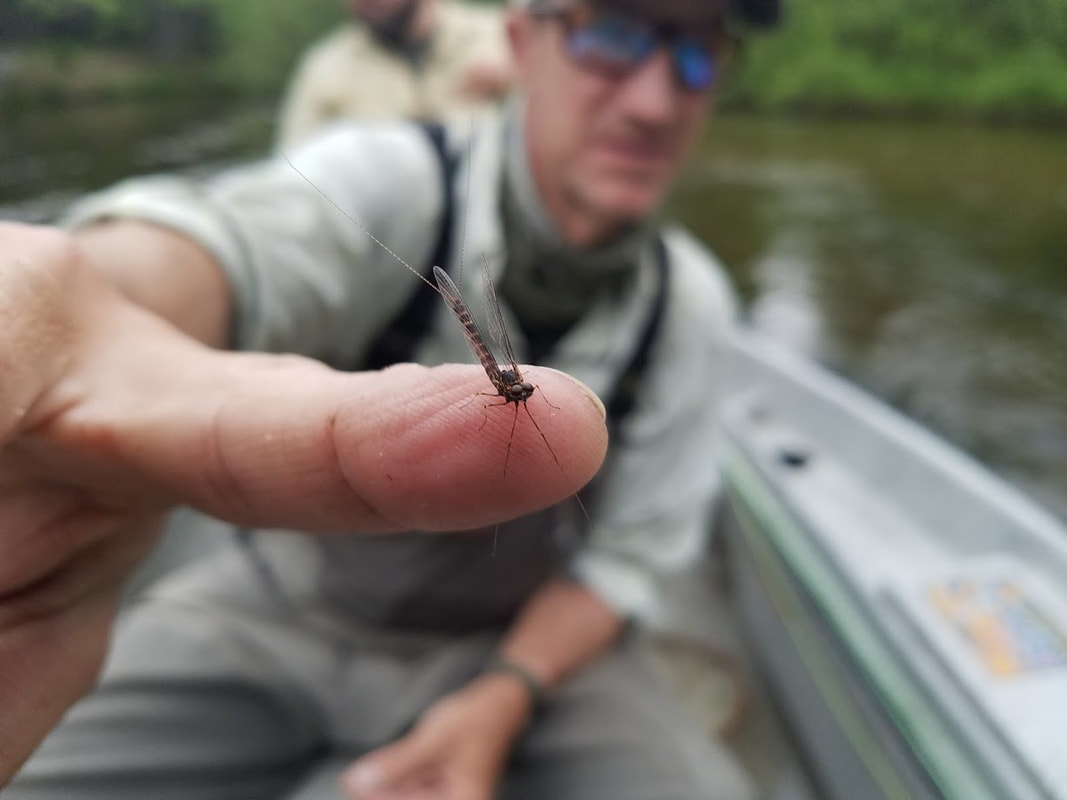|
By Drew YoungeDyke (Originally published in the May 2021 issue of Woods-n-Waters News)
On vacation on Kauai a few years ago, I took a surf lesson on Hanalei Bay from Titus Kinemaka’s Hawaiian School of Surfing. As a souvenir, I bought a ballcap from the surf shop with his name and the words “Kai Kane” on it, meaning “waterman.” I’ve seen the term waterman used often since then as I’ve read more about surfing, referring to someone who makes a living from the water like lifeguards, guides, and surfing instructors, and is well-rounded in water sports like surfing, stand-up paddling, paddling kayaks and canoes, fishing, diving, sailing, and swimming. I’ve wondered often how the concept of a waterman – or waterwoman – would translate to Michigan’s Great Lakes and inland waters. Waterman seems to be a term that is more than the sum of its definitions. It’s a term of reverence. It’s used for people like Duke Kahanamoku – the “Father of Surfing” – who won several Olympic gold medals for the United States and set world records in swimming in the early Twentieth Century, popularized surfing around the world, and once rescued 24 people from an overturned boat off the California coast. Or Eddie Aikau, a big-wave surfer and the first lifeguard at Hawaii’s famed Waimea Bay, who rescued hundreds as a lifeguard and died himself while paddling his surfboard for help to rescue his crew of an overturned replica of an ancient catamaran in 1978. More recently, the term is used for people like Kai Lenny, a champion surfer and kiteboarder from Hawaii who once kiteboarded across Lake Michigan. As best I can tell, waterman is an aspirational concept that you can’t really just call yourself. It’s not like saying “I hunt and fish, so I’m an outdoorsman.” It seems to be more like when all the other hunters and anglers say, “we all hunt and fish, but old so-and-so is a true outdoorsman.” It’s not just reserved for men, either – it’s one of those terms that isn’t gender-specific in common usage even though it literally is written as such. A waterman seems to be someone inextricably connected with the water. With 3,288 miles of Great Lakes coastline, over 51,000 river miles, and over 11,000 inland lakes, I know there are some men and women in Michigan for whom waterman might be an apt descriptor. I asked a few folks who I know and think embody that term what it means to them in a Michigan context. Brian Kozminski is a fly-fishing guide and the owner of True North Trout in Boyne City, a sales rep for Temple Fork Outfitters, and a river rafting guide for Jordan Valley Outfitters: “I am not a waterman in the aspect of being a lifeguard or surfer, unless you dig deeper into the definition of life guard - I protect and look out for the well-being of my inland lakes and rivers, the voice or the guardian of these sacred places that carry so much vitality. The rhythms of the waves or the flow of a river are a part of me, they are my serenity and it is near the water that I feel connected to life and being alive. So I guess in that sense, I am a surfer, with my children as we seek out adventure along the Great Lakes in a canoe or SUP, or in a stream where we turn over a rock to inspect the macroinvertebrate life that resides in these hallowed spaces. These rivers and lakes give me purpose and fulfill my soul - thereby, I am a waterman.” Brian’s answer gave me a lot to think about. There’s an inescapable element of conservation in it. I’ve fished with Brian and, drifting down the Manistee River, he knew every eddy, every current, every cut bank. He understands the water and what’s happening in it. And he lives it, from recreation to conservation. He’s active in several conservation organizations like Backcountry Hunters & Anglers, Trout Unlimited, the Great Lakes Business Network, and the National Wildlife Federation. In addition to guiding anglers from his drift boat, I’ve seen him fishing from a stand-up paddleboard and you can watch him drifting a motorboat backwards down a river on Season 2 of MeatEater’s Das Boat series. Another person I thought of was Tom Werkman, owner and guide at Werkman Outfitters on the Grand River. I asked him what it would mean to be a waterman in Michigan. “It means I intimately have a connection to the river on which I guide, the Grand River. It means I have a responsibility, as a guide, to educate my clients on the history of the Grand, that it’s one of ruin to recovery. It means, I need to get my clients on fish so they can make a connection to the Grand. If all of this happens, it means, for me, that I have done my job of showing my clients that the Grand River is a viable urban fishing corridor worthy of protection.” Tom, too, has an unmistakable conservation message in his definition: conserving his waters, being connected to them, and connecting others to them. I’ve also fished with Tom, and like Brian, his connection to and knowledge of his waters and their history is paramount. Tom is also a member of the Great Lakes Business Network, several conservation organizations, and has used his platform to speak up for Michigan’s public lands and against dredging the Grand River. And in addition to guiding anglers from a drift boat, he also surfs and competes in triathlons. What does it mean to be a waterman in Michigan? While I can ponder it, it’s not up to me to define it. From two people I respect who make a living on our waters by connecting other people to them and spending their free time conserving them, though, I suspect it involves a genuine visceral connection to the water, making a living or spending a great deal of time on the water, understanding it deeply, connecting other people to it, advocating and volunteering for its conservation, and being well-rounded in water-based sports and modes of transportation. I think there’s an element of water safety to it, too. The Great Lakes can be deadly. 30 years later, I still remember the fear of being caught in a Lake Superior rip current swimming when I was 11 or 12. I’m learning more about that and Great Lakes currents while learning about freshwater surfing. I think about that when I read about the increase in Great Lakes drownings the past few years, often people swimming out too far or being swept off piers. The great Hawaiian watermen were revered not just for their skill in water sports, but for their heroism in saving others and their deep understanding of how to safely move in the water to be able to make those rescues. The point of this exercise is not to label people, though, as waterman or not; that’s not my call to make. It’s to think about qualities that all of us who spend time around and on the Great Lakes and Michigan’s inland lakes and rivers can strive to emulate. If we fish a river, we can learn a little more about its history and ecology. If we participate in water sports, we can learn more about water safety, both for ourselves and to help others. We can learn and improve our skills at new water sports and modes of transportation so that we can be out there more often in more diverse conditions. If we spend time on the Great Lakes, we can learn more about its cycles, currents, aquatic life, and waves. We can leverage our own existing connections to the water to introduce new people to them. And we can all put more of our time, effort, and attention into conserving and protecting our waters. |
AUTHOR
Drew YoungeDyke is an award-winning freelance outdoor writer and a Director of Conservation Partnerships for the National Wildlife Federation, a board member of the Outdoor Writers Association of America, and a member of the Association of Great Lakes Outdoor Writers and the Michigan Outdoor Writers Association.
All posts at Michigan Outside are independent and do not necessarily reflect the views of NWF, Surfrider, OWAA, AGLOW, MOWA, the or any other entity. ARCHIVES
June 2022
SUBJECTS
All
|



 RSS Feed
RSS Feed